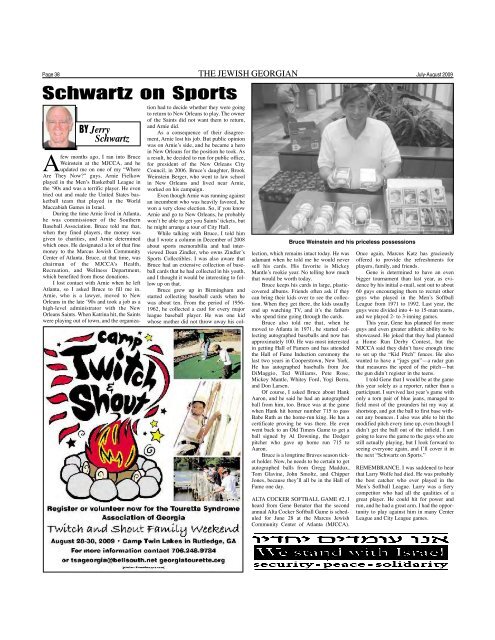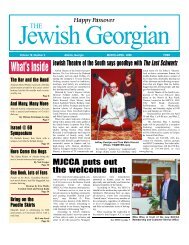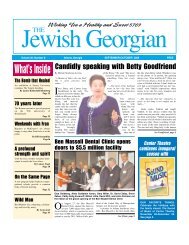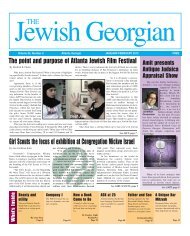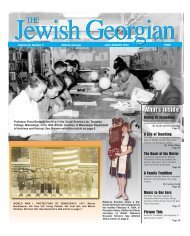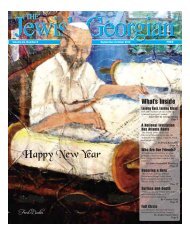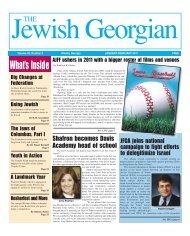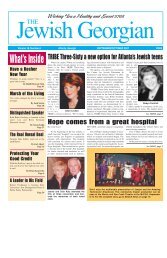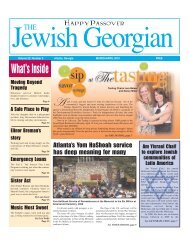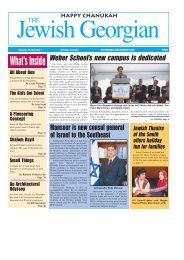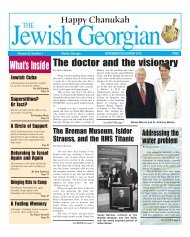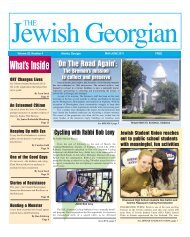JGA July-August 09 - The Jewish Georgian
JGA July-August 09 - The Jewish Georgian
JGA July-August 09 - The Jewish Georgian
You also want an ePaper? Increase the reach of your titles
YUMPU automatically turns print PDFs into web optimized ePapers that Google loves.
Page 38 THE JEWISH GEORGIAN <strong>July</strong>-<strong>August</strong> 20<strong>09</strong><br />
Schwartz on Sports<br />
A<br />
BY Jerry<br />
Schwartz<br />
few months ago, I ran into Bruce<br />
Weinstein at the MJCCA, and he<br />
updated me on one of my “Where<br />
Are <strong>The</strong>y Now?” guys. Arnie Fielkow<br />
played in the Men’s Basketball League in<br />
the ‘90s and was a terrific player. He even<br />
tried out and made the United States basketball<br />
team that played in the World<br />
Maccabiah Games in Israel.<br />
During the time Arnie lived in Atlanta,<br />
he was commissioner of the Southern<br />
Baseball Association. Bruce told me that,<br />
when they fined players, the money was<br />
given to charities, and Arnie determined<br />
which ones. He designated a lot of that fine<br />
money to the Marcus <strong>Jewish</strong> Community<br />
Center of Atlanta. Bruce, at that time, was<br />
chairman of the MJCCA’s Health,<br />
Recreation, and Wellness Department,<br />
which benefited from those donations.<br />
I lost contact with Arnie when he left<br />
Atlanta, so I asked Bruce to fill me in.<br />
Arnie, who is a lawyer, moved to New<br />
Orleans in the late ‘90s and took a job as a<br />
high-level administrator with the New<br />
Orleans Saints. When Katrina hit, the Saints<br />
were playing out of town, and the organiza-<br />
tion had to decide whether they were going<br />
to return to New Orleans to play. <strong>The</strong> owner<br />
of the Saints did not want them to return,<br />
and Arnie did.<br />
As a consequence of their disagreement,<br />
Arnie lost his job. But public opinion<br />
was on Arnie’s side, and he became a hero<br />
in New Orleans for the position he took. As<br />
a result, he decided to run for public office,<br />
for president of the New Orleans City<br />
Council, in 2006. Bruce’s daughter, Brook<br />
Weinstein Berger, who went to law school<br />
in New Orleans and lived near Arnie,<br />
worked on his campaign.<br />
Even though Arnie was running against<br />
an incumbent who was heavily favored, he<br />
won a very close election. So, if you know<br />
Arnie and go to New Orleans, he probably<br />
won’t be able to get you Saints’ tickets, but<br />
he might arrange a tour of City Hall.<br />
While talking with Bruce, I told him<br />
that I wrote a column in December of 2008<br />
about sports memorabilia and had interviewed<br />
Dean Zindler, who owns Zindler’s<br />
Sports Collectibles. I was also aware that<br />
Bruce had an extensive collection of baseball<br />
cards that he had collected in his youth,<br />
and I thought it would be interesting to follow<br />
up on that.<br />
Bruce grew up in Birmingham and<br />
started collecting baseball cards when he<br />
was about ten. From the period of 1956-<br />
1962, he collected a card for every major<br />
league baseball player. He was one kid<br />
whose mother did not throw away his col-<br />
Bruce Weinstein and his priceless possessions<br />
lection, which remains intact today. He was<br />
adamant when he told me he would never<br />
sell his cards. His favorite is Mickey<br />
Mantle’s rookie year. No telling how much<br />
that would be worth today.<br />
Bruce keeps his cards in large, plasticcovered<br />
albums. Friends often ask if they<br />
can bring their kids over to see the collection.<br />
When they get there, the kids usually<br />
end up watching TV, and it’s the fathers<br />
who spend time going through the cards.<br />
Bruce also told me that, when he<br />
moved to Atlanta in 1971, he started collecting<br />
autographed baseballs and now has<br />
approximately 100. He was most interested<br />
in getting Hall of Famers and has attended<br />
the Hall of Fame Induction ceremony the<br />
last two years in Cooperstown, New York.<br />
He has autographed baseballs from Joe<br />
DiMaggio, Ted Williams, Pete Rose,<br />
Mickey Mantle, Whitey Ford, Yogi Berra,<br />
and Don Larsen.<br />
Of course, I asked Bruce about Hank<br />
Aaron, and he said he had an autographed<br />
ball from him, too. Bruce was at the game<br />
when Hank hit homer number 715 to pass<br />
Babe Ruth as the home-run king. He has a<br />
certificate proving he was there. He even<br />
went back to an Old Timers Game to get a<br />
ball signed by Al Downing, the Dodger<br />
pitcher who gave up home run 715 to<br />
Aaron.<br />
Bruce is a longtime Braves season ticket<br />
holder. Now, he needs to be certain to get<br />
autographed balls from Gregg Maddux,<br />
Tom Glavine, John Smoltz, and Chipper<br />
Jones, because they’ll all be in the Hall of<br />
Fame one day.<br />
ALTA COCKER SOFTBALL GAME #2. I<br />
heard from Gene Benator that the second<br />
annual Alta Cocker Softball Game is scheduled<br />
for June 28 at the Marcus <strong>Jewish</strong><br />
Community Center of Atlanta (MJCCA).<br />
Once again, Marcus Katz has graciously<br />
offered to provide the refreshments for<br />
players, family, and friends.<br />
Gene is determined to have an even<br />
bigger tournament than last year, as evidence<br />
by his initial e-mail, sent out to about<br />
60 guys encouraging them to recruit other<br />
guys who played in the Men’s Softball<br />
League from 1971 to 1992. Last year, the<br />
guys were divided into 4- to 15-man teams,<br />
and we played 2- to 3-inning games.<br />
This year, Gene has planned for more<br />
guys and even greater athletic ability to be<br />
showcased. He joked that they had planned<br />
a Home Run Derby Contest, but the<br />
MJCCA said they didn’t have enough time<br />
to set up the “Kid Pitch” fences. He also<br />
wanted to have a “jugs gun”—a radar gun<br />
that measures the speed of the pitch—but<br />
the gun didn’t register in the teens.<br />
I told Gene that I would be at the game<br />
this year solely as a reporter, rather than a<br />
participant. I survived last year’s game with<br />
only a torn pair of blue jeans, managed to<br />
field most of the grounders hit my way at<br />
shortstop, and got the ball to first base without<br />
any bounces. I also was able to hit the<br />
modified pitch every time up, even though I<br />
didn’t get the ball out of the infield. I am<br />
going to leave the game to the guys who are<br />
still actually playing, but I look forward to<br />
seeing everyone again, and I’ll cover it in<br />
the next “Schwartz on Sports.”<br />
REMEMBRANCE. I was saddened to hear<br />
that Larry Wolfe had died. He was probably<br />
the best catcher who ever played in the<br />
Men’s Softball League. Larry was a fiery<br />
competitor who had all the qualities of a<br />
great player. He could hit for power and<br />
run, and he had a great arm. I had the opportunity<br />
to play against him in many Center<br />
League and City League games.


